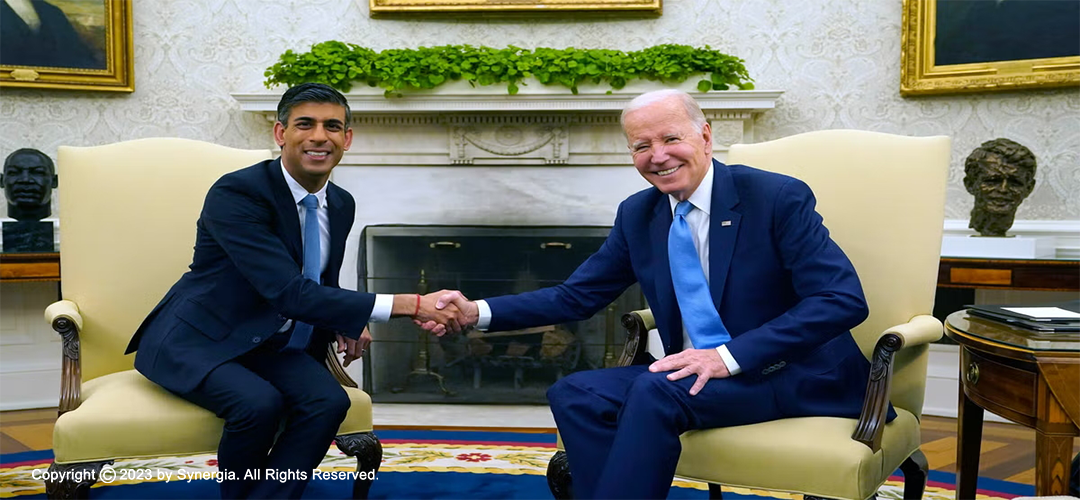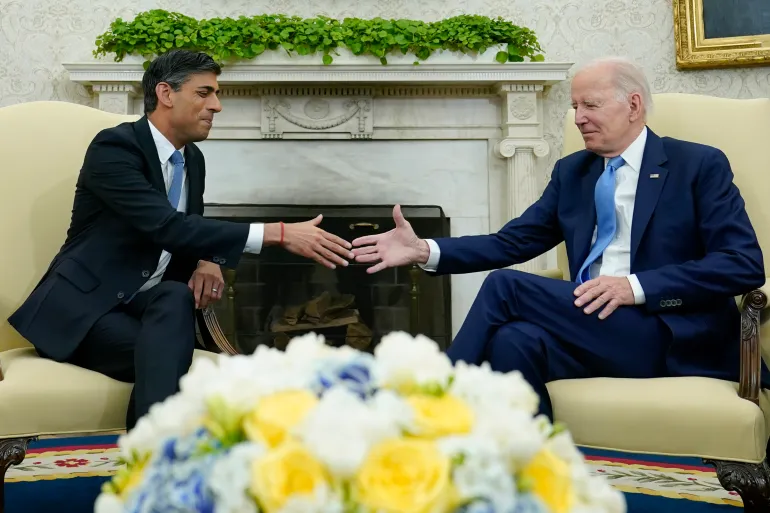Closing the Atlantic Gap?
June 17, 2023 | Expert Insights

Anglophone English-speaking countries generally have a strong affinity for each other.
Out of these countries, the United Kingdom and the United States have had the most far-reaching impact in the world. In all seriousness, it has also been said that the only thing that divides these countries is a common language!
While both countries have shouldered wars and regional conflicts side by side for over a century, geo-politically, they have sometimes been on different pages. The Trump era was marked by a drift in their relationship as the "America First" policy gained traction across the Atlantic. Mr Biden has been working at resetting it to its historical closeness. BREXIT, guided to its conclusion by Boris Johnson, never received American favour.
Background
The British once had an empire over which the sun never set. But in the 21st century, they are seen as no more than an adjunct to the larger American worldview! BREXIT has further isolated the British, and it would be the correct time to reaffirm their century-old affinity to their cousins across the Atlantic.
The EU experiment did not work for the British, dominated as the bloc is by continental powers like Germany and France, despite all the benefits it accrued to the British economy. Workers came from other European countries, along with investment. British nationals could travel easily in European countries. They could also trade easily with them without any of the associated problems linked with bureaucratic red tape.
It was hoped that once Brexit was done the United Kingdom could look to the United States and the Commonwealth countries as alternatives to the EU market. But all the post-Brexit British Prime Ministers starting with Theresa May, followed by Boris Johnson and then Liz Truss, bungled the process. And now, it is Rishi Sunak’s turn to change the narrative.

Analysis
PM Sunak's visit to Washington was a two-day affair. Nothing major was expected in such a short period of time. And nothing earth-shattering happened.
It was Sunak’s first visit to the White House as the Prime Minister. Post-summit utterances clearly indicate that the focus was on the economy and the Ukraine war. Both sides agreed to bolster 'economic security' vis a vis China's growing global influence.
What is being called the 'Atlantic Declaration' included measures to reduce trade barriers, closer defence industry ties (underscored by the early AUKUS agreement on the supply of nuclear subs to Australia) and a data protection deal. A.I. figured prominently in the discussion, with both sides acknowledging its utility and the threat that it posed.
Citing Leslie Vinjamuri, director at Chatham House, the Times magazine succinctly summed up the relationship, “Britain is really important to the U.S., and sometimes it risks being taken for granted, but if you look at every major security issue—defence, intelligence, China, Russia, technology—the U.S. and the U.K. are side by side.”
It is a well-known fact that President Biden was against BREXIT and its negative impact on his place of ancestry, Northern Ireland. However, encouraged by Mr Sunak's mature and discreet handling of the Northern Island question post-Brexit, American anxieties have somewhat subsided.
Even though Sunak and Biden are not compatible with each other does not mean that there cannot be points of convergence between the two. This is what the two sides worked on during the meeting. The much more experienced U.S. leader had words of wisdom for the much younger British Prime Minister. The point of convergence is the common threats that both countries face. This includes the ongoing war between Russia and Ukraine, China’s expansionist agenda, climate change and artificial intelligence. These challenges go above and beyond any ideological or political differences. They cannot be ignored. The U.S. needs the U.K. by its side to tackle these issues. Here the UK is not an indispensable partner but a necessary one nonetheless.
A post-Brexit comprehensive UK-US Free Trade Agreement has not been achieved. Rather a series of sector-wise deals have been agreed upon. This was expected. Washington was unhappy with how Northern Ireland was left in limbo after Brexit. It wanted clarity and assurances that the Good Friday Agreement, which established peace in Northern Ireland, would be adhered to. The British failed to give these assurances in a timely manner. As a result, the United States has decided that it will not give the United Kingdom the special privilege of a free trade partnership.
Britain is today firmly within the economic orbit of America. It cannot dictate the terms. It has to accept the cards which it is given. Common cultural and historical linkages have not resulted in American embrace. Realpolitik has won the day. The U.S. does not want to harm the U.K. At the same time, it does not want to give it a free ride.
Assessment
- Both London and Washington will coordinate their trade policies more closely now to counter Beijing. This compliments their already strong security partnership, which has been enhanced through the AUKUS framework. This does not mean that the U.S. is abandoning the E.U. Instead, it is trying to sail on two boats at the same time.
- Brexit is not going to be reversed any time soon. The British must use all their ingenuity and acumen to make the best of what they get. The complacent attitude that somehow post-Brexit Britain will naturally re-establish its position in the world order has to be done away with. The Atlantic Declaration seeks to close this gap, underscoring the UK's vulnerabilities.








Comments